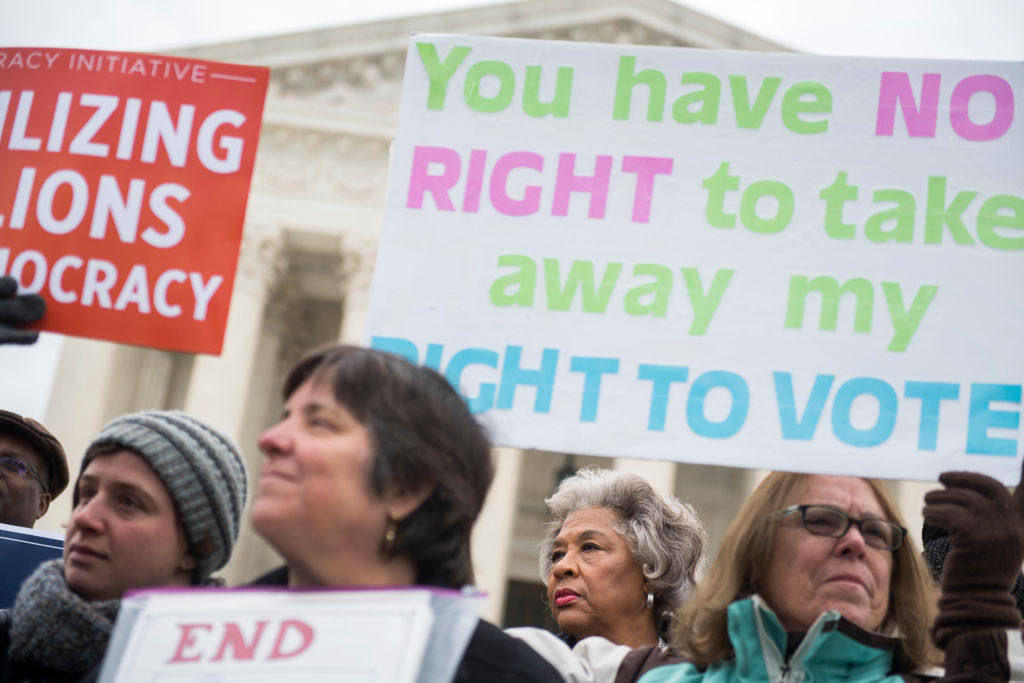Op-Ed: Voter Purges Amount To Voter Suppression
Source: Tom Williams / Getty
Imagine showing up to vote, excited about the opportunity to elect candidates aligned with your values, only to learn that you cannot vote. You learn that you are ineligible because you were erroneously removed from the voting rolls, which are voting registration lists. The worst part is that local election officials didn’t bother to tell you nor give you an opportunity to contest their decision. Now you’re at the polls, possibly with a child or grandchild in tow, and you cannot exercise your democratic right to vote. Let that sink in. You cannot participate. And you will not be made whole in time to vote in this election cycle.
This is the position tens of thousands of Mississippi voters found themselves in during the 2022 and 2023 elections. That’s why my organization, One Voice, launched its election protection program. We tell people to go out and vote, and we want to ensure that when they show up, they can, in fact, vote.
MORE: Senate Democrats Reintroduce John Lewis Voting Rights Act Ahead Of Bloody Sunday Anniversary
Advocacy organizations have long been concerned with threats to the right to vote. In addition to voter access, we are also mindful of the impact of widespread voter purges, a stealth voter suppression scheme. Under the guise of list maintenance, election officials are removing scores of voters from the voting rolls. We’ve engaged circuit clerks to receive lists of voters who had been purged so that we could communicate with them and help them notify election officials of the error. In 2023, we received information from just 5 of 82 counties in Mississippi, but in those 5 counties, over 50,000 people were purged from the voting lists. If 50,000 people were removed from just 5 counties, imagine the total volume of people removed in the other 77 counties.
It saddens me that this problem is not isolated to Mississippi. Ohio allegedly removed 26,000 voters from the rolls prior to the 2023 election. This was the same election where there was a measure on the ballot to protect abortion access. Georgia removed nearly 190,000 voters from the rolls before the 2023 election, and the secretary of state in Georgia identified another 82,000 voters who it suspected of being ineligible to vote. More than 26,000 voters were removed from active voter lists in Louisiana in 2023. List maintenance ceases to be benign when Black and Brown voters are disproportionately impacted by it.
New Tactic
For years, when people thought about voter suppression, they thought of intimidation at the polls, polling place closures, polling place changes, inadequate polling place resources – which leads to long lines on election day – and restrictive voter ID laws. But voter purges are also a stealth and emerging voter suppression tactic. For instance, the Brennan Center for Justice “found that between 2014 and 2016, states removed almost 16 million voters from the rolls — a 33 percent increase over the period between 2006 and 2008. The increase was highest in states with a history of voting discrimination.”
It is unacceptable that some of the same states that have a history of discriminating against Black voters are failing to sufficiently notify voters that they have been removed from the rolls in time for them to participate in elections. And in some states, private citizens are being deputized to challenge the voter registration status of other citizens. Based on a 2021 law in Georgia, any voter can request voter registration lists and then flag for the secretary of state which voters should be considered for removal. CBS News reported, “In the two years since the law passed, a CBS News investigation found more than 80,000 challenges have been filed against Georgia voters — many of them by a loose network of about a dozen conservative activists.”
Unsurprisingly, once a person is removed, they often have no way to get back on the rolls in time to vote. And many people won’t know they’ve been removed until they attempt to vote. What is more, the rationale state officials are using to remove voters is arbitrary at best. For instance, if voters haven’t voted in a previous election cycle, they can be removed. But voting rights should never be rescinded and state officials shouldn’t police a person’s participation history.
It is the winter of 2024. If we want a fair and open process during the 2024 elections, there must be action to hold accountable states with a history of broad voter purges, especially those that are in the South.
Nsombi Lambright-Haynes is the executive director of One Voice in Mississippi and a member of the Black Southern Women’s Collaborative.
SEE ALSO:
Voter Purges Are Increasing Across The South. We Must Put A Stop To The Practice
Here’s What To Do About Voter Purges
The post Op-Ed: Voter Purges Amount To Voter Suppression appeared first on NewsOne.

